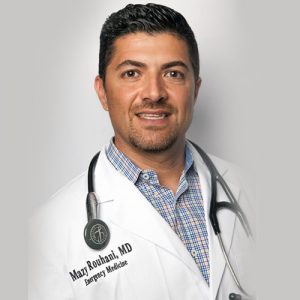Men With Low Testosterone Could Have More Severe COVID-19 Symptoms
Evidence suggests that low testosterone levels can lead to more severe symptoms of COVID-19.
By now, you are certainly familiar with the symptoms that can be caused by the coronavirus. COVID-19 is a respiratory infection.
It most often results in “flu-like” symptoms. These can include fever, body aches, chills, cough, and shortness of breath.
In its most severe cases, COVID-19 can lead to acute respiratory distress, which can lead to life-threatening pneumonia, multi-organ failure, septic shock, and death.
Recent studies have found that men with low testosterone are far more likely to experience the worst symptoms of the disease and are more likely to die from a COVID-19 infection than men with normal testosterone levels.
This is distressing news for men between the ages of 55 and 65, an age group that is already more likely to suffer severe symptoms from COVID. That is because low testosterone is very common in this age group. Once you are over 30, your testosterone level starts to drop at a rate of 1% – 2% every year.
By the time you are 70, your testosterone level is likely to be half of what it was in your 20s. Due to this steady decline, most men over 40 have some degree of low testosterone. A recent study published in the journal Medical Hypotheses found a direct correlation between testosterone levels and worse outcomes in male COVID-19 patients.
According to the study, COVID-19 patients with low testosterone levels have reportedly developed severe symptoms requiring ventilator support because of “the ACE-2 receptor upregulation in respiratory cells, elevated risk of lung damage, and respiratory muscle catabolism.”
The researchers concluded, “Lower serum testosterone level is a poor prognostic indicator for patients with COVID-19 by deregulating pulmonary protective pathways.” This is all the more reason why older men should be among the first to be vaccinated for COVID-19.
Even if you have been vaccinated, men over 40 still should be concerned about low testosterone.
Why Else Are Testosterone Levels So Important?
Having low testosterone has far-reaching impacts on your health beyond increasing your risk of a more severe, even fatal, case of COVID. Most men between the ages of 35 and 65 are suffering from some degree of age-related testosterone deficiency.
The symptoms of age-related low testosterone include:
- Low libido and erectile dysfunction
- Lack of energy
- Loss of lean muscle
- Weight gain, particularly increased belly fat
- Disturbed sleep
- Mood swings, depression, and anxiety
- Memory loss and cognitive difficulties
Any disease or injury that impacts the testes could lead to low testosterone in men. However, the primary cause of low testosterone or “andropause” in men over 40 is the normal drop in testosterone that occurs as men age.
Despite its continued need, once you exit your teen years, your testosterone levels start to decline steadily. It is this drop in testosterone levels that occur the older you get that is primarily responsible for low testosterone in men.
The good news is that testosterone replacement therapy can give you back what time and nature take away.
What Are the Benefits of Testosterone Replacement Therapy?
Here are some of the many benefits that hundreds of patients are experiencing from testosterone replacement at our West Palm Beach, Florida-based hormone clinics right now.
A 2009 study concluded that “Restoring testosterone levels to within the normal range by using testosterone replacement therapy can improve many of the effects of [low testosterone].
Most importantly, these include beneficial effects on mood, energy levels, patients’ sense of well-being, sexual function, lean body mass, muscle strength, bone mineral density (BMD), cognition, and some benefits on cardiovascular risk factors.”
In addition, testosterone replacement therapy has been shown to provide:
- Improved skin and hair health
- Increased strength and vitality
- Weight loss
- Improved heart health
- Stronger bones
- Improved sleep
- Improved focus and cognition
The Best Treatments for Age-Related Hormone Decline
 You deserve to enjoy an active and healthy lifestyle at any age! But, unfortunately, as men and women age, your levels of critical hormones like testosterone drop, which harm your ability to enjoy life.
You deserve to enjoy an active and healthy lifestyle at any age! But, unfortunately, as men and women age, your levels of critical hormones like testosterone drop, which harm your ability to enjoy life.
Hormone replacement therapy, or HRT, is the key to getting back what time and nature take away. Hormone Logics has been successfully treating patients with age-related hormone loss with our unique hormone replacement therapies for men and women for many years.
Medical research has shown that testosterone replacement and/or HGH replacement therapy are extremely effective ways to treat age-related hormone decline. Hormone Logics’ HRT treatments for men and women have been proven to offer individuals between the ages of 35 and 65 a greatly improved quality of life.
Our medical director is Mazyar Rouhani, MD. Dr. Rouhani has long been a medical innovator. He is a co-founder of Symptify, an online symptom checker to better educate patients about their conditions. Recently, Dr. Rouhani has focused his endeavors on improving patients’ health using IV fluid hydration.
Using his medical expertise combined with his passion for optimizing each individual’s health and vitality, Dr. Rouhani combines his knowledge and expertise to provide the integrated approach to antiaging medicine to help his patients look and feel their best.
“The team at Hormone Logics provides cutting-edge health options that have improved my quality of life. Their friendly and professional staff offer a wide range of health and fitness programs which have made a huge difference.”
Michael H. West Palm Beach, FL
If you would like to learn a little bit more about the many life-changing benefits of growth hormone replacement therapy, please contact us today by calling (561) 640-3333.









